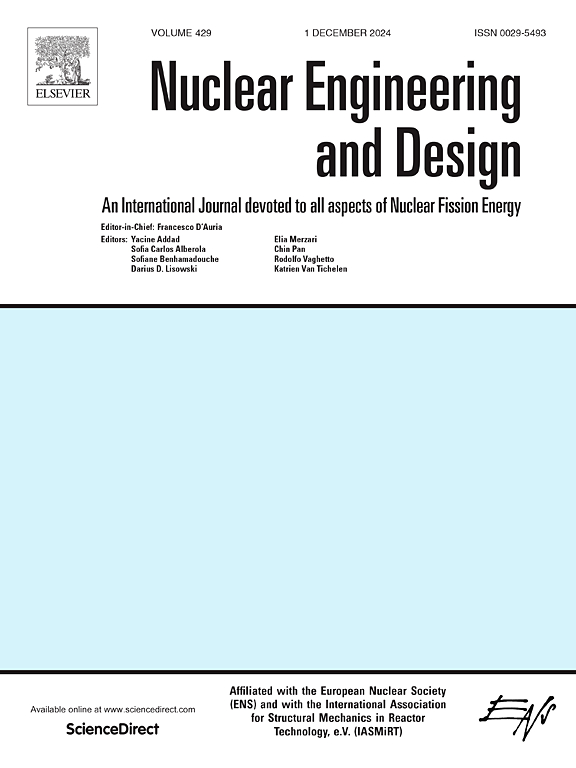Monte Carlo multiphysics simulation on adaptive unstructured mesh geometry
IF 1.9
3区 工程技术
Q1 NUCLEAR SCIENCE & TECHNOLOGY
引用次数: 0
Abstract
Monte Carlo simulation based on Constructive Solid Geometry (CSG) brings unique challenges for multiphysics simulation, including establishing field transfers with mesh-based physics codes, the combination of stochastic and deterministic solvers, and high computational expense. In this work, an adaptive, on-the-fly mesh-based Monte Carlo geometry algorithm is implemented in Cardinal to reduce the barrier-to-entry for high-fidelity multiphysics by (i) eliminating ambiguity in defining CSG cells for temperature and density feedback, (ii) enabling simple mesh convergence studies, and (iii) more closely integrating Computer Aided Design (CAD) workflows with Monte Carlo methods. During Picard iterations, an OpenMC mesh geometry is adaptively refined or coarsened by contouring temperature and/or density fields from a thermal-fluid solver. This algorithm is applied to a full-core Molten Salt Fast Reactor (MSFR) geometry with NekRS Large Eddy Simulation (LES) coupled to OpenMC neutron transport. A performance study indicates a net speedup of 2.3 in the OpenMC solver when using an adaptive geometry for cell sizes chosen intermediate to the as-built CAD geometry versus 1:1 element tracking, which points to future algorithmic research in accelerated Monte Carlo mesh tracking.
自适应非结构网格几何上的蒙特卡罗多物理场模拟
基于建构实体几何(CSG)的蒙特卡罗仿真为多物理场仿真带来了独特的挑战,包括与基于网格的物理代码建立场转移、随机求解器与确定性求解器的结合以及高计算费用。在这项工作中,卡迪纳尔实施了一种基于网格的自适应、即时蒙特卡洛几何算法,以通过以下方式降低高保真多物理场仿真的门槛:(1)消除为温度和密度反馈定义 CSG 单元时的模糊性;(2)实现简单的网格收敛研究;(3)将计算机辅助设计(CAD)工作流程与蒙特卡洛方法更紧密地结合起来。在 Picard 算法迭代过程中,通过对热流体求解器产生的温度场和/或密度场进行轮廓分析,OpenMC 网格几何形状会自适应地细化或粗化。该算法被应用于全核熔盐快堆(MSFR)几何图形,NekRS 大涡模拟(LES)与 OpenMC 中子传输耦合。性能研究表明,在使用自适应几何图形时,单元大小的选择介于竣工 CAD 几何图形与 1:1 元素跟踪之间,OpenMC 求解器的净速度提高了 2.3 倍,这为加速蒙特卡罗网格跟踪的未来算法研究指明了方向。
本文章由计算机程序翻译,如有差异,请以英文原文为准。
求助全文
约1分钟内获得全文
求助全文
来源期刊

Nuclear Engineering and Design
工程技术-核科学技术
CiteScore
3.40
自引率
11.80%
发文量
377
审稿时长
5 months
期刊介绍:
Nuclear Engineering and Design covers the wide range of disciplines involved in the engineering, design, safety and construction of nuclear fission reactors. The Editors welcome papers both on applied and innovative aspects and developments in nuclear science and technology.
Fundamentals of Reactor Design include:
• Thermal-Hydraulics and Core Physics
• Safety Analysis, Risk Assessment (PSA)
• Structural and Mechanical Engineering
• Materials Science
• Fuel Behavior and Design
• Structural Plant Design
• Engineering of Reactor Components
• Experiments
Aspects beyond fundamentals of Reactor Design covered:
• Accident Mitigation Measures
• Reactor Control Systems
• Licensing Issues
• Safeguard Engineering
• Economy of Plants
• Reprocessing / Waste Disposal
• Applications of Nuclear Energy
• Maintenance
• Decommissioning
Papers on new reactor ideas and developments (Generation IV reactors) such as inherently safe modular HTRs, High Performance LWRs/HWRs and LMFBs/GFR will be considered; Actinide Burners, Accelerator Driven Systems, Energy Amplifiers and other special designs of power and research reactors and their applications are also encouraged.
 求助内容:
求助内容: 应助结果提醒方式:
应助结果提醒方式:


